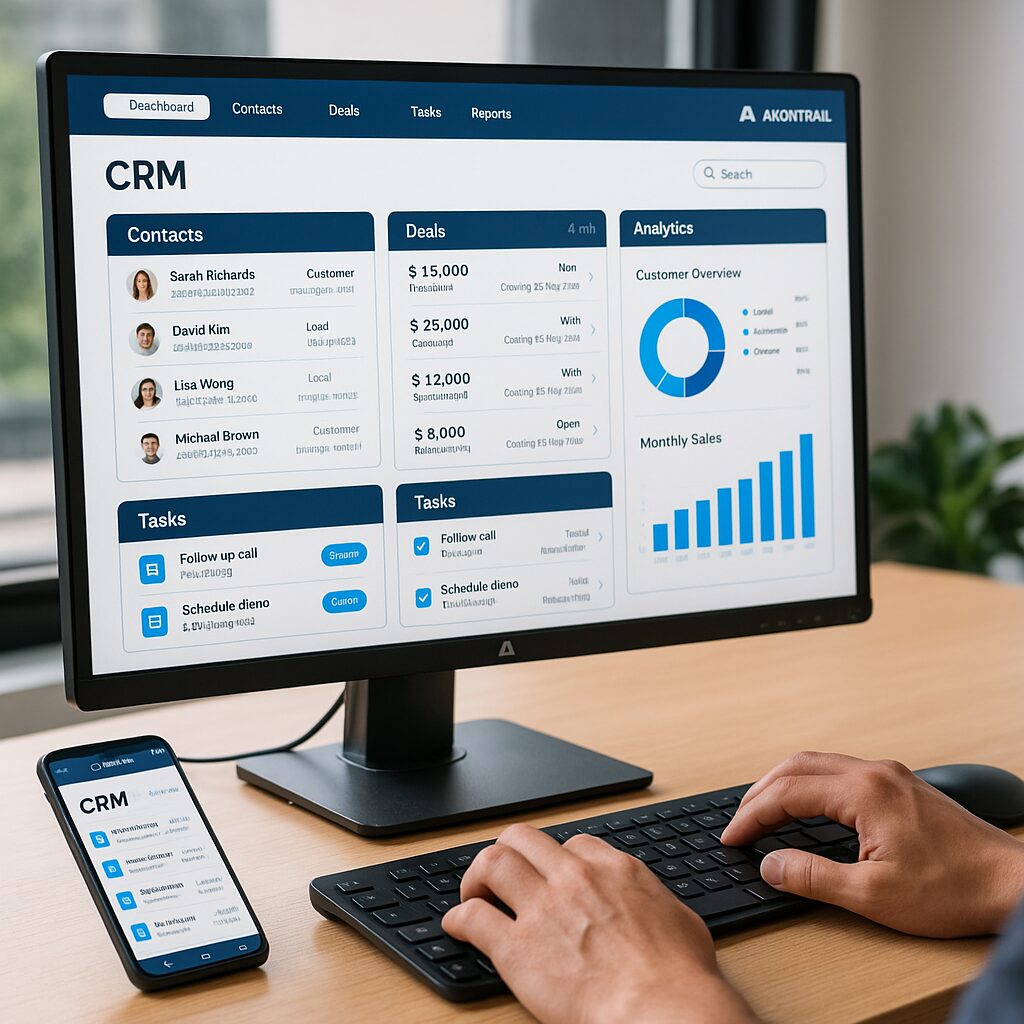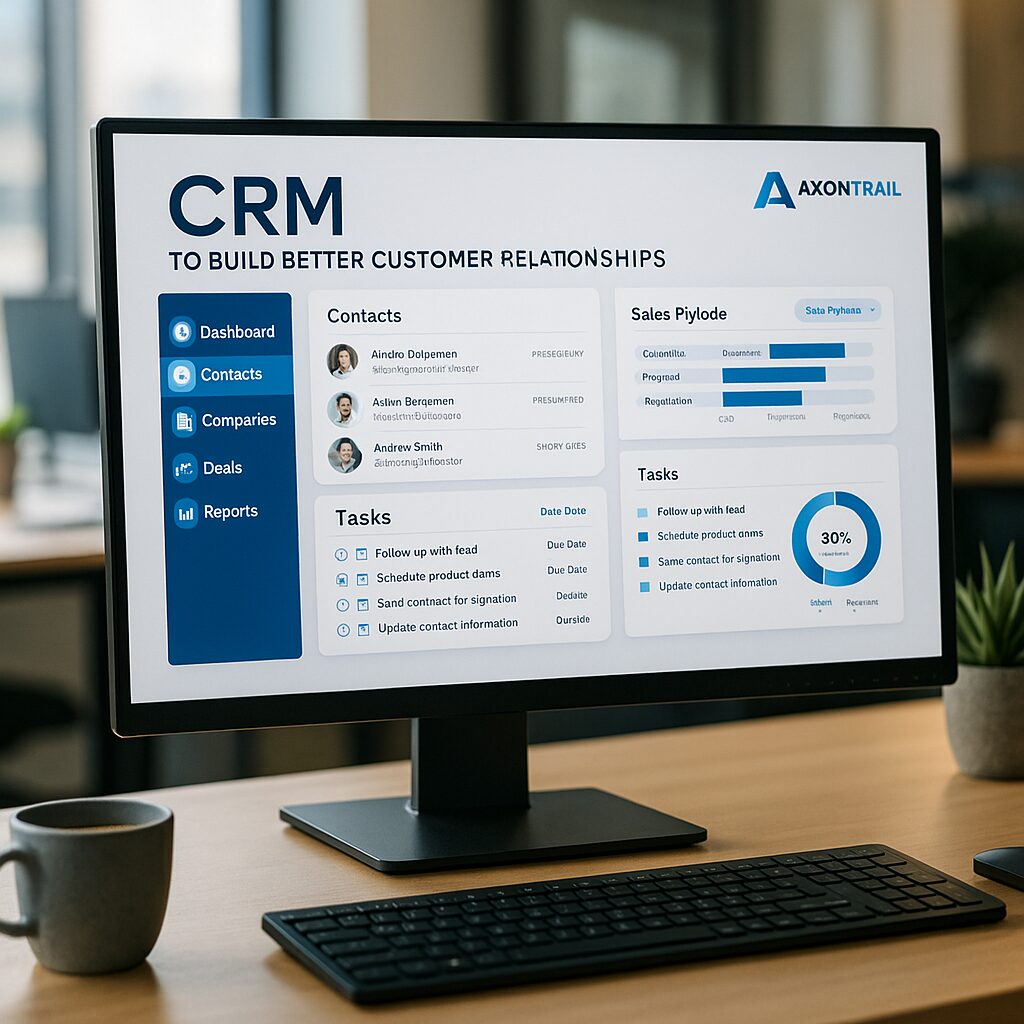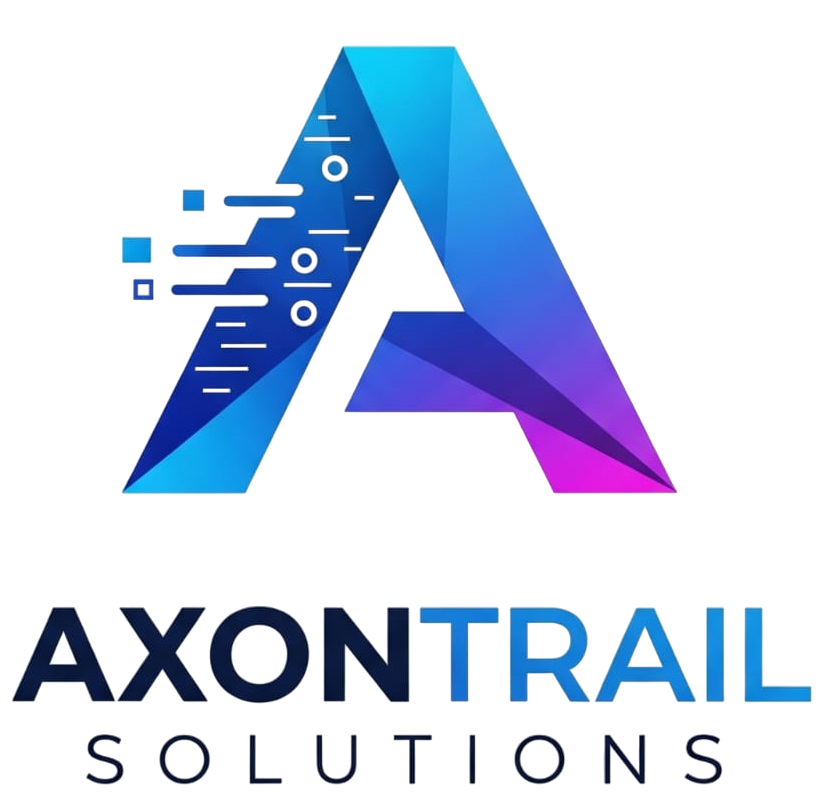
- July 18, 2025
- AxonTrail Editorial Team
- 0
Table of Contents
ToggleTips to Build Better Customer Relationships Using CRM Tools
Introduction
Customer relationships are the lifeblood of any successful enterprise. In today’s hyper‑competitive market, the ability to build better customer relationships can define long‑term success. Modern CRM tools aggregate data from multiple touchpoints, empowering businesses to understand customer behaviour, personalise interactions and deliver consistently high service levels. By implementing a robust CRM platform, organisations can streamline communication, automate routine tasks and gain valuable insights into purchasing patterns and preferences.
This blog will explore practical tips to build better customer relationships using CRM tools. We will cover everything from choosing the right system and centralising data to training your team and continuously refining your approach. Whether you are a small enterprise or a large corporation, these strategies will help you unlock the full potential of CRM and forge stronger, more enduring connections with your customers. Let us dive into the essential steps to harness CRM for relationship‑building excellence.
Understanding the Benefits of CRM Tools
CRM platforms offer a centralised hub for customer data, communication history and detailed transaction records. Understanding these benefits is the first step to build better customer relationships, as it unlocks visibility that manual processes simply cannot match. By consolidating information from sales, marketing and support channels, teams gain a 360‑degree view of each client’s journey—from initial lead generation through to post‑sale service. This holistic perspective ensures that no enquiry slips through the cracks and that every interaction reflects the customer’s preferences and previous experiences.
Moreover, CRM analytics uncover actionable insights such as purchasing trends, service issues and engagement metrics. Leveraging these data points enables highly targeted outreach and proactive support schedules, both of which are crucial to fostering strong customer bonds over time. Efficient segmentation allows businesses to deliver personalised offers, while automated reminders guarantee consistent follow‑ups. Ultimately, CRM tools not only streamline daily workflows but also cultivate a culture of responsiveness and personalisation, establishing the foundation for long‑term loyalty and accelerated growth.
Choose the Right CRM Platform
(Build Better Customer Relationships)
Selecting an appropriate CRM solution tailored to your organisation’s scale and objectives is essential. The market offers a vast array of platforms, ranging from simple, user‑friendly cloud‑based systems to comprehensive enterprise‑grade suites. To build better customer relationships, opt for a CRM that supports customisable workflows, robust reporting and seamless integration with your existing tools, such as email marketing, helpdesk and accounting software.
Evaluate ease of use: a clean interface reduces training time and encourages adoption, preventing data silos. Assess scalability: ensure the system can grow with your business and accommodate new users or modules. Prioritise security and compliance: verify that the provider offers data encryption, access controls and compliance with regional regulations. Budget is another critical consideration: weigh licensing costs, implementation fees and ongoing subscription expenses against expected ROI. Run hands‑on demos with sample workflows to verify real‑world performance and usability. Finally, consider vendor support and community resources: responsive customer service, knowledge bases and active user forums can be invaluable when configuring and troubleshooting your CRM deployment.
Centralise Customer Data
Centralising customer information is at the heart of any successful relationship strategy. When data from sales pipelines, support tickets and marketing campaigns converges in a single CRM repository, teams can access up‑to‑the‑minute records on each interaction. This unified resource helps to build better customer relationships by ensuring that all departments speak from the same playbook, reducing response times and preventing miscommunication.
Implement data validation rules to maintain accuracy and avoid duplicate records, which can undermine customer trust. Use custom fields to capture nuanced details—such as product preferences, contract renewal dates or communication preferences—and employ tags to segment contacts by industry, region or engagement level. Regularly audit your CRM database to retire outdated entries and standardise naming conventions. A clean, centralised database not only empowers your staff to engage customers with confidence, but also lays the groundwork for analytics‑driven improvements and personalised outreach.
Personalise Communication
One of the most effective ways to build better customer relationships is to personalise communication at every touchpoint. CRM tools enable you to craft dynamic email templates that automatically insert client names, reference previous purchases and suggest relevant products or services. Sending tailored messages demonstrates genuine interest and shows customers that you understand their unique needs and challenges.
Beyond email, leverage CRM‑driven segmentation to deliver targeted content across social media, chatbots and SMS campaigns. This multi‑channel approach can build better customer relationships by ensuring that your messaging resonates with each audience segment. Behavioural triggers—such as abandoned shopping carts or service renewals—can prompt timely outreach, further reinforcing your commitment to customer success. Remember to balance automation with human oversight, reviewing template performance and tweaking language to keep communications fresh and genuine. By embedding personalisation into your workflows, you foster stronger emotional connections, drive higher engagement and convert satisfied clients into enthusiastic advocates.
Automate Routine Tasks
(Build Better Customer Relationships)
Automating routine tasks frees your team from repetitive chores, allowing them to concentrate on high‑value activities and build better customer relationships. CRM platforms can trigger automated workflows for tasks such as lead assignment, appointment reminders and follow‑up emails. These processes reduce human error and ensure timely response, which is key to maintaining customer satisfaction.
Set up automated scoring to prioritise high‑potential leads or at‑risk accounts, routing them to the appropriate personnel for personalised attention. Use workflow automation to schedule regular check‑ins, service renewals and feedback surveys, so no customer is overlooked. Consider integrating AI‑powered chatbots for initial queries; they can resolve common issues instantly and escalate complex requests to human agents. This balanced approach to automation not only improves response times but also preserves a personal touch, since customers receive consistent, helpful support without feeling abandoned to machines.

Analyse Customer Data for Insights
Data analytics within CRM systems provide the intelligence necessary to build better customer relationships by revealing patterns and trends that inform decision‑making. Custom dashboards can display metrics such as average response time, customer satisfaction scores and lifetime value, enabling you to highlight areas of excellence and opportunity.
Use predictive analytics to anticipate customer needs—such as recommending add‑on services based on previous purchases—and automate those suggestions within your CRM. This proactive stance helps you build better customer relationships by demonstrating foresight and adding value beyond the initial sale. Regularly review A/B test results for email subject lines, call scripts and promotional offers to refine your approach. Across team meetings, share these insights to foster a data‑driven culture and ensure alignment on customer centricity. Continuous analysis and refinement ensure your strategies evolve with customer expectations, driving better outcomes and cementing loyalty.
Integrate CRM with Other Systems
Integrating your CRM with other business applications—such as email marketing platforms, e‑commerce engines and accounting software—ensures seamless data flow and comprehensive visibility into customer activity. A unified ecosystem allows you to build better customer relationships by coordinating campaigns, support and billing without manual data transfers or silos.
APIs and marketplace connectors simplify these integrations, but it’s essential to plan data mappings carefully to preserve data integrity. For instance, ensure that contact records synchronise bi‑directionally, so updates in one system reflect across all platforms. Automate cross‑platform triggers—for example, translating a completed purchase into a post‑sale service task within the CRM. Consider integrating your CRM with a customer‑success platform to track onboarding metrics and churn risk. Linking support ticketing systems can provide real‑time alerts for urgent issues, allowing your team to respond within SLA commitments and uphold brand reputation. The result is an end‑to‑end process that delights customers with consistent, efficient interactions and frees your team from tedious reconciliations.
Train Your Team Effectively
(Build Better Customer Relationships)
Even the most powerful CRM fails without proper user adoption. To build better customer relationships, invest in comprehensive training programmes that cover both technical functionality and best‑practice processes. Tailored workshops, on‑demand tutorials and quick‑reference guides enable staff to navigate the system confidently and uncover advanced features.
Assign internal CRM champions who can offer peer‑to‑peer support and share tips for efficient usage. Encourage feedback from end users to identify pain points and refine custom fields or workflows accordingly. Regular refresher sessions keep the team up to date on new releases and feature enhancements. Monitor user engagement statistics—such as login frequency and feature utilisation—to spot training gaps early. Reward teams for meeting CRM adoption targets with recognition or incentives. A well‑trained workforce not only maximises tool ROI but also drives superior customer experience.
Monitor and Refine Your CRM Strategy
Continuous monitoring and refinement of your CRM strategy ensure long‑term success and help build better customer relationships. Establish key performance indicators (KPIs) such as customer satisfaction (CSAT), net promoter score (NPS) and average resolution time, then review these metrics in regular cadence meetings.
Solicit direct customer feedback via surveys and social listening tools, and feed insights back into your CRM for action. Use dashboards to identify bottlenecks—such as slow response rates or high ticket volumes in specific segments—and adjust workflows accordingly. Host quarterly strategy workshops to revisit goals, celebrate successes and retrain staff on emerging features. Consider implementing rolling audits of data quality and compliance, particularly if your business operates across multiple regions with varying data protection laws. Additionally, benchmark your performance against industry peers to set realistic targets and inspire continuous improvement.
Conclusion
Building enduring customer loyalty demands commitment, alignment and the right technological foundation. By following these practical tips—from selecting the ideal CRM platform and centralising data to personalising communication and automating workflows—you can build better customer relationships and foster a culture of customer centricity throughout your organisation. Continuous analysis, system integration and team training further reinforce your ability to anticipate needs and exceed expectations.
AxonTrail Solutions specialises in helping businesses deploy and optimise CRM systems tailored to specific goals. Contact us today to learn how our expertise can help you build better customer relationships and drive sustainable growth.
Frequently Asked Questions
1. What is a CRM and why is it important?
A CRM (Customer Relationship Management) system centralises customer data, tracks interactions and automates workflows. It’s important because it helps businesses deliver consistent, personalised experiences that drive loyalty. Build better customer relationships using CRM tools—boost engagement, retention and loyalty with data‑driven insights.
2. How do I choose the right CRM for my business?
Assess your organisation’s size, budget and integration requirements. Look for ease of use, scalability, security features and reliable vendor support when comparing options.
3. How long does CRM implementation usually take?
Implementation timelines vary based on system complexity and data migration needs. Small teams can onboard basic platforms in 4–6 weeks, while large deployments may take 3–6 months.
4. Can I migrate data from legacy systems into my CRM?
Yes. Most CRM platforms offer import tools and APIs to migrate contacts, leads and transaction histories from spreadsheets or older databases.
5. How do I measure CRM success?
Track KPIs such as user adoption rates, customer satisfaction (CSAT), net promoter score (NPS) and average response times to gauge overall effectiveness.
6. What training methods work best for CRM adoption?
Combine hands‑on workshops, video tutorials and quick‑reference guides. Identifying internal champions and monitoring usage metrics can help maintain momentum.
7. How often should I review my CRM workflows?
Conduct quarterly reviews to assess performance, retire outdated processes and identify new automation opportunities in line with evolving business goals.
8. Is it possible to integrate my CRM with social media platforms?
Absolutely. Many CRMs offer native connectors or third‑party integrations that pull social media interactions into the customer record for unified engagement tracking.
9. How do I ensure data quality in my CRM?
Implement validation rules, use mandatory fields, routinely de‑duplicate records and perform periodic audits to keep the database accurate and actionable.
10. What support does AxonTrail Solutions provide for CRM projects?
We offer end‑to‑end services including platform selection, customisation, integration, data migration, training and ongoing optimisation to ensure your CRM delivers maximum ROI.
